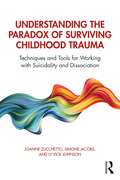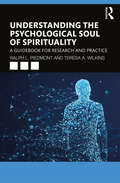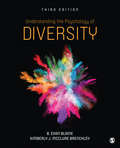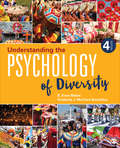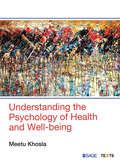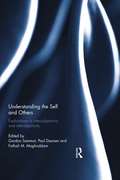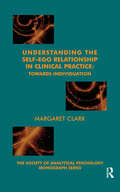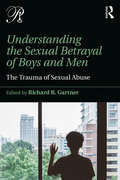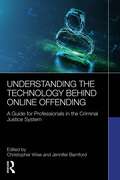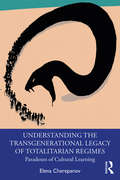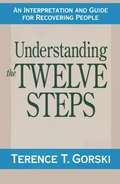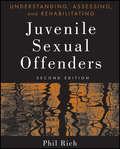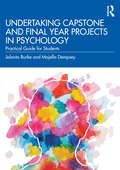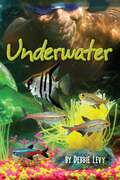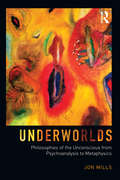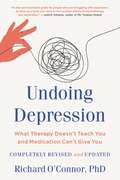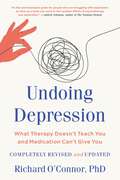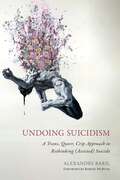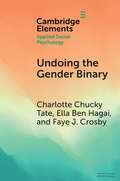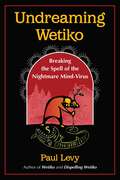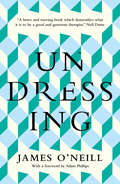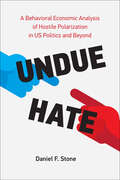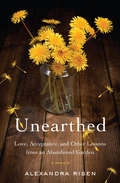- Table View
- List View
Understanding the Paradox of Surviving Childhood Trauma: Techniques and Tools for Working with Suicidality and Dissociation
by Joanne Zucchetto Simone Jacobs Ly Vick JohnsonUnderstanding the Paradox of Surviving Childhood Trauma offers clinicians a new framework for understanding the symptoms and coping mechanisms displayed by survivors of childhood abuse. This approach considers how characteristics such as suicidality, self-harm, persistent depression, and anxiety can have roots in behaviors and beliefs that helped patients survive their trauma. This book provides practitioners with case examples, practical tips, and techniques for applying this mindset directly to their most complex cases. By depathologizing patients’ experiences and behaviors, and moving beyond simply managing them, therapists can reduce their clients’ shame and work collaboratively to understand the underlying message that these behaviors conceal.
Understanding the Psychological Soul of Spirituality: A Guidebook for Research and Practice
by Ralph L. Piedmont Teresa A. WilkinsUnderstanding the Psychological Soul of Spirituality is a comprehensive exploration of spiritual constructs based on an empirical, evidence-based paradigm for understanding and addressing spirituality. In a field where there is no current consensus on spirituality, this book provides a much-needed psychologically based definition and ontology that assists helping professionals in formulating their professional identities; developing effective and appropriate training models; furthering their understanding of what spirituality is and is not, from a psychological perspective; and more effectively addressing spiritual issues to support clients. The authors provide a review of current issues in the area of spirituality, also called the numinous, and provide perspectives that address these concerns in ways that promote a fully scientific understanding of the construct. Ultimately the book provides a concise definition of the numinous that places it squarely in the social sciences. Chapters outline the clear value of the numinous for psychology and detail its relevance for professionals’ training.
Understanding the Psychology of Diversity
by B. Evan Blaine Kimberly J. BrenchleyThe updated Third Edition of this best seller presents a highly readable examination of diversity from a unique psychological perspective to teach students how to understand social and cultural differences in today’s society. By exploring how individuals construct their view of social diversity and how they are defined and influenced by it, author B. Evan Blaine and new coauthor Kimberly J. McClure Brenchley present all that psychology has to offer on this critically important topic. The new edition features chapters on traditional topics such as categorization, stereotypes, sexism, racism, and sexual prejudice, in addition to chapters on nontraditional diversity topics such as weightism, ageism, and social stigma. Integrated throughout the text are applications of these topics to timely social issues.
Understanding the Psychology of Diversity
by B. Evan Blaine Kimberly J. BrenchleyThe updated Third Edition of this best seller presents a highly readable examination of diversity from a unique psychological perspective to teach students how to understand social and cultural differences in today’s society. By exploring how individuals construct their view of social diversity and how they are defined and influenced by it, author B. Evan Blaine and new coauthor Kimberly J. McClure Brenchley present all that psychology has to offer on this critically important topic. The new edition features chapters on traditional topics such as categorization, stereotypes, sexism, racism, and sexual prejudice, in addition to chapters on nontraditional diversity topics such as weightism, ageism, and social stigma. Integrated throughout the text are applications of these topics to timely social issues.
Understanding the Psychology of Diversity
by Bruce E. Blaine Kimberly J. BrenchleyUnderstanding the Psychology of Diversity offers a highly accessible examination of diversity to show students how to understand social and cultural differences in today’s society. Taking a psychological perspective, authors B. Evan Blaine and Kimberly J. McClure Brenchley explore how individuals construct their view of social diversity and how they are defined and influenced by it. The book covers traditional topics like categorization and stereotypes, sexism, racism, and social stigma, as well as non-traditional topics like sexual orientation-based prejudice, weight and appearance-based prejudice, diversity on television, and age stereotypes and ageism. The Fourth Edition confronts the credibility crisis that has surfaced in the academic psychological research community by following parameters for the research that is presented.
Understanding the Psychology of Diversity
by Bruce E. Blaine Kimberly J. BrenchleyUnderstanding the Psychology of Diversity offers a highly accessible examination of diversity to show students how to understand social and cultural differences in today’s society. Taking a psychological perspective, authors B. Evan Blaine and Kimberly J. McClure Brenchley explore how individuals construct their view of social diversity and how they are defined and influenced by it. The book covers traditional topics like categorization and stereotypes, sexism, racism, and social stigma, as well as non-traditional topics like sexual orientation-based prejudice, weight and appearance-based prejudice, diversity on television, and age stereotypes and ageism. The Fourth Edition confronts the credibility crisis that has surfaced in the academic psychological research community by following parameters for the research that is presented.
Understanding the Psychology of Health and Well-being
by Meetu KhoslaThe textbook provides a holistic understanding of health and well-being through the presentation of multicultural concepts and practices in the field. Understanding the Psychology of Health and Well-being offers theoretical insights and empirical evidence from both Western and Indian perspectives to comprehensively cover various components of and practices in health and well-being. It elucidates the historical framework, nature, theoretical foundations, research progresses and examples to provide a better understanding of psychological impacts on health and well-being. The book emphasizes on the need to develop cultural sensitivity to enhance health and well-being across cultures and how culture offers pathways to understand ill health and developing interventions to deal with health issues appropriately. The use of robust pedagogical features makes this textbook an invaluable companion for students of psychology at undergraduate and postgraduate levels. It will also serve the requirements of students of other behavioural sciences, nursing, healthcare workers, counsellors, social workers and policymakers across a range of disciplines. Key Features: • Focuses exclusively on the relevance of maintaining health and wellbeing, and how to sustain and promote it • Discussion on each topic complemented by updates on current research findings and latest trends in the field • Each chapter aided by key pedagogical features to support contemporary teaching - learning practices • Uses mini cases, illustrations and 'did you know' vignettes in each chapter to make learning interactive and exemplary
Understanding the Self and Others: Explorations in intersubjectivity and interobjectivity
by Fathali M. Moghaddam Gordon Sammut Paul DaanenHow do we, as human beings, come to understand ourselves and others around us? This question could not be more timely or pertinent to the issues facing humankind today. At the heart of many of our world’s most troubling political and social problems lies a divergence, and sometimes a sharp contradiction, in perspectives between nations and cultural groups. To find potential solutions to these seemingly intractable divides, we must come to understand what both facilitates and hinders a meaningful exchange of fundamental ideas and beliefs between different cultural groups. The discussions in this book aim to provide a better understanding of how we come to know ourselves and others. Bringing together a number of cutting edge researchers and practitioners in psychology and related fields, this diverse collection of thirteen papers draws on psychology, sociology, philosophy, linguistics, communications, and anthropology to explore how human beings effectively come to understand and interact with others. This volume is organised in three main sections to explore some of the key conceptual issues, discuss the cognitive processes involved in intersubjectivity and interobjectivity, and examine human relations at the level of collective processes. Understanding the Self and Others will appeal to students and scholars of sociology, developmental psychology, philosophy, communication studies, anthropology, identity studies, social and cultural theory, and linguistics.
Understanding the Self-Ego Relationship in Clinical Practice: Towards Individuation (The Society of Analytical Psychology Monograph Series)
by Margaret ClarkUnderstanding the Self-Ego Relationship in Clinical Practice: Towards Individuation is a volume in the clinical practice monograph series from The Society of Analytical Psychology. This series is intended primarily for trainees on psychotherapy and psychodynamic counselling courses, and for those who are newly qualified. These compact editions will be invaluable to all who wish to learn the basics of major theories derived from the work of Freud and Jung, from an integrated viewpoint. The authors are Jungian analysts trained at the SAP, highly experienced in both theory and practice. The author argues for the profound importance of trusting the unconscious psyche in therapeutic work with adults. She considers various analytical meanings of the term "the self", with reference to a wide range of theorists, and various ways of thinking about the development of the ego. She uses primarily a Jungian model of the psyche from a developmental perspective, based on the assumption that the ego evolves in infancy and childhood out of a primary psychosomatic self.
Understanding the Sexual Betrayal of Boys and Men: The Trauma of Sexual Abuse (Psychoanalysis in a New Key Book Series)
by Richard B. GartnerUnderstanding the Sexual Betrayal of Boys and Men: The Trauma of Sexual Abuse is an indispensable go-to book for understanding male sexual victimization. It has become increasingly clear since the 1980s that men and boys, like women and girls, are sexually abused and assaulted in alarming numbers. Yet there have been few resources available to victims, their loved ones, or those trying to help them. Richard B. Gartner was in the vanguard of clinicians treating male sexual victimization and has written extensively about it, initially in professional papers, then in his landmark 1999 book for clinicians Betrayed as Boys: Psychodynamic Treatment of Sexually Abused Men, continuing with his 2005 work Beyond Betrayal: Taking Charge of Your Life after Boyhood Sexual Abuse. He has been a tireless teacher, clinician, and advocate for male victims of sexual abuse in the classroom, the lecture hall, and of course the consulting room as well as in newspaper, television, radio, and online interviews. Dr. Gartner has gathered together expert colleagues from the trauma, psychoanalytic, medical, and survivor treatment fields. Together, they have created a comprehensive guide to what was once thought to be a rarity but now is clearly an all-too-common occurrence. Understanding the Sexual Betrayal of Boys and Men looks at the realities of male sexual victimization, guiding clinicians and lay people alike to understand the complexities of the devastation it causes in victimized boys and men. It considers topics as diverse as: sexual assault in institutions like the military, sports teams, schools, universities, and religious organizations; sex trafficking of boys and adolescents; neurobiology and brain chemistry of male survivors of sexual abuse; gender and sexual dysfunctions and confusions resulting from sexual exploitation and trauma; physicians’ treatment of sexually abused men’s medical problems; socio-cultural influences on processing and treating men’s and boys’ sexual victimization. Understanding the Sexual Betrayal of Boys and Men is required reading for anyone working with male victims of sexual abuse and assault at any level – psychotherapists, rape counselors, attorneys, journalists, guidance counselors, physicians, clergy, graduate students, and lawmakers – and helpful to lay people interested in this often-unrecognized problem.
Understanding the Technology Behind Online Offending: A Guide for Professionals in the Criminal Justice System
by Christopher Wise Jennifer BamfordUnderstanding the Technology Behind Online Offending: A Guide for Professionals in the Criminal Justice System is a non-technical explanation of online offences by a cybersecurity expert, bridging the gap between the high-tech world of cybercrime and the non-technical professionals working within it.The book begins by equipping the reader with a foundational understanding of how the internet works before exploring the various ways that people can exploit the Internet to commit crimes. The reader is then introduced to some of the sophisticated ways that individuals may evade detection before we explore the organisations fighting to prevent and capture those offending online. The book includes a contributory chapter from solicitors at Stone King LLP to help the reader understand how the law is evolving to prosecute offenders. There is a further contributory chapter from psychologist Dr Ruth J Tully who discusses psychological risk assessment with those who offend online. The book concludes with important chapters looking at how professionals can keep themselves safe online, and future directions of the internet.The book's intended audience includes all professionals who work with those who commit online offences, such as psychologists, solicitors, social workers, probation officers and police officers. The book is also suitable for those in training or graduate education.
Understanding the Transgenerational Legacy of Totalitarian Regimes: Paradoxes of Cultural Learning
by Elena CherepanovUnderstanding the Transgenerational Legacy of Totalitarian Regimes examines the ways in which the cultural memory of surviving totalitarianism can continue to shape individual and collective vulnerabilities as well as build strength and resilience in subsequent generations. The author uses her personal experience of growing up in the former Soviet Union and professional expertise in global trauma to explore how the psychological legacy of totalitarian regimes influences later generations’ beliefs, behaviors, and social and political choices. The book offers interdisciplinary perspectives on the complex aftermath of societal victimization in different cultures and discusses survivors’ experiences. Readers will find practical tools that can be used in family therapy, cognitive-behavioral therapy, and peace building to recognize and challenge preconceived assumptions stemming from cultural trauma. This book equips trauma-minded mental health professionals with an understanding of the transgenerational toxicity of totalitarianism and with strategies for becoming educated consumers of cultural legacy.
Understanding the Twelve Steps: An Interpretation and Guide for Recovering People
by Terence T. GorskiMillions of people have transformed their lives by working the Twelve Steps of Alcoholics Anonymous. Their success has come from their ability to truly understand these principles and to apply them in their daily lives. Yet for many embarking on the road to recovery, the Steps can seem vague, even confusing. This practical, no-nonsense guide takes the mystery out of the Twelve Steps, presenting a straightforward explanation of what each step means, as well as examples of how it translates to real life. Written by a certified alcoholism and drug abuse counselor with more than twenty years of experience, it offers a wealth of wisdom, knowledge, and genuine support for anyone in recovery. Understanding the Twelve Steps features: Clear, easy-to-understand interpretation of the Twelve Steps -- the vital building blocks of recovery Checklists that summarize the tasks and objectives of each step The Twelve Promises -- the positive changes you can expect in your life if you follow the Twelve Steps What happens at Twelve Step meetings and why it is important to have a sponsor The experiences, strength, and hope of other recovering people
Understanding, Assessing, and Rehabilitating Juvenile Sexual Offenders
by Phil RichPraise for Understanding, Assessing, and Rehabilitating Juvenile Sexual Offenders, Second Edition "The Second Edition of Understanding, Assessing, and Rehabilitating Juvenile Sexual Offenders showcases Phil Rich's experience and mastery of the research and clinical literature. In my view, this is an excellent therapy book and, like its predecessor, will help practitioners to work effectively and ethically with juvenile offenders. It is destined to become a classic. " -Tony Ward, PhD, DipClinPsy; Victoria University of Wellington, Wellington, New Zealand "Phil Rich is considered one of the world's leading authorities on how best to understand, assess, and treat juvenile sexual offenders, and this Second Edition of his excellent text shows why he is held in such high regard. All theoreticians, researchers, and practitioners whose work brings them in contact with juvenile sexual offenders should definitely read this remarkable book. " -W. L. Marshall, OC, FRSC, PhD; Director, Rockwood Psychological Services, Ontario, Canada "Phil Rich's book, Understanding, Assessing, and Rehabilitating Juvenile Sexual Offenders, Second Edition offers new and thought-provoking ideas, updates, and information, especially on developmental pathways. This book is one of the few publications on juvenile sexual offending that offers something new and revealing to the field. " -Robert E. Longo, LPC, NCC, ACS, BCIA-EEG, BCN; Serendipity Healing Arts, Lexington, North Carolina "Phil Rich masterfully fills the gap in the juvenile sexual offender treatment literature with a book that is neither introductory nor narrowly specialized. Seasoned veterans will appreciate his thoughtful and studied approach. Newcomers will find this book a vital go-to resource. " -David Prescott, LICSW, Clinical Director, Becket Family of Services, Falmouth, Maine "Mind-blowingly brilliant-Rich by name and rich in depth, detail, description, and debate. An instant classic, Understanding, Assessing, and Rehabilitating Juvenile Sexual Offenders, Second Edition is both comprehensive and challenging with its material and messages, yet reassuringly accessible and practical. " -Martin C. Calder, Calder Social Work Training and Consultancy, Leigh, Lancashire, UK THE LANDMARK TEXT FOR WORKING WITH JUVENILE SEXUAL OFFENDERS AND UNDERSTANDING SEXUALLY ABUSIVE BEHAVIOR IN CHILDREN AND ADOLESCENTS-NOW FULLY REVISED Thoroughly revised, the Second Edition of Understanding, Assessing, and Rehabilitating Juvenile Sexual Offenders guides mental health professionals through the breadth of assessment and intervention methods available for working with this special population, providing a succinct yet complete survey of the field, the etiological development of sexually abusive behavior in juveniles, and a reliable resource for assessment, treatment, and rehabilitation.
Undertaking Capstone and Final Year Projects in Psychology: Practical Guide for Students
by Jolanta Burke Majella DempseyUndertaking Capstone and Final Year Projects in Psychology serves a seminal purpose in guiding its readers to create a capstone project. The text employs traditional and emerging methodologies and methods in order to posit an exhaustive approach that the psychology students can adopt to see their project to fruition. The text aims at fortifying the reader’s skills through the structure of its chapters as they begin to work on their capstone or final year project. The chapters collectively explore the varied aspects that are involved in the completion of a final year project, that is, beginning from the inception of the idea to laying the foundation, designing the project, analysing the data, and, finally, presenting the findings. The text guides the reader through each step and provides further guidance on approaching the idea, coming up with the research question, positioning it within the epistemological and ontological context, and constructing the theoretical framework to arrive at the optimal design solutions. The text will be useful for psychology students who are currently completing a capstone or a final year project. It is further aimed at psychology students who will subsequently be working on a project and are looking forward to gaining cognisance regarding the approach and the methodology to be adopted for the same.
Underwater (Exceptional Reading And Language Arts Titles For Intermediate Grades Ser.)
by Debbie LevyTwelve-year-old Gabe has ambitions to be the next Jacques Cousteau...or Bill Gates...or who? Gabe's anxiety about growing up is matched by his fear that he'll be crazy (like his brother). But he finds some relief in his underwater computer game, setting up his own aquarium, and swimming on the local team. Could it be that some things will just take care of themselves?
Underworlds: Philosophies Of The Unconscious From Psychoanalysis To Metaphysics
by Jon MillsThe first book of its kind to provide a detailed analysis of the history of the unconscious from the underworlds of Greek and Egyptian mythology to psychoanalysis and metaphysics, Jon Mills presents here a unique study of differing philosophies of the unconscious. Mills examines how three major philosophical systems on the nature of the unconscious emerge after modern philosophy, finding their most celebrated elaborations in Freud, Lacan and Jung. These three psychoanalytic traditions, quite separate from one another in terms of their emphasis and philosophical presuppositions, are scrutinised alongside contemporaneous movements in existential phenomenology, semiotics, epistemology, transcendental psychology and Western metaphysics in the texts of Hegel, Heidegger, Sartre and Whitehead. Underworlds provides a scholarly exegesis and critique of the main philosophies of the unconscious to have transpired in the history of ideas. Exploring the unconscious from its philosophical beginnings in antiquity to its systematic articulation brought about by the rise of psychoanalysis, Underworlds is ideal for practicing psychoanalysts, academics of Freud, Jung and Lacan, and scholars of psychology, philosophy and the humanities.
Undoing Depression: What Therapy Doesn't Teach You and Medication Can't Give You
by Richard O'ConnorLike heart disease, says psychotherapist Richard O'Connor, depression is fueled by complex and interrelated factors: genetic, biochemical, environmental. In this refreshingly sensible book, O'Connor focuses on an additional factor often overlooked: our own habits. Unwittingly we get good at depression. We learn how to hide it, how to work around it. We may even achieve great things, but with constant struggle rather than satisfaction. Relying on these methods to make it through each day, we deprive ourselves of true recovery, of deep joy and healthy emotion. UNDOING DEPRESSION teaches us how to replace depressive patterns with a new and more effective set of skills. We already know how to "do" depression--and we can learn how to undo it. With a truly holistic approach that synthesizes the best of the many schools of thought about this painful disease, O'Connor offers new hope--and new life--for sufferers of depression.
Undoing Depression: What Therapy Doesn't Teach You and Medication Can't Give You
by Richard O'ConnorThe bestselling approachable guide that has inspired thousands of readers to manage or overcome depression — fully revised and updated for life in the 21st century.Depression rates around the world have skyrocketed in the 20‑plus years since Richard O'Connor first published his classic book on living with and overcoming depression. Nearly 40 million American adults suffer from the condition, which affects nearly every aspect of life, from relationships, to job performance, physical health, productivity, and, of course, overall happiness. And in an increasingly stressful and overwhelming world, it's more important than ever to understand the causes and effects of depression, and what we can do to overcome it. In this fully revised and updated edition — which includes updated information on the power of mindfulness, the relationship between depression and other diseases, the risks and side effects of medication, depression&’s effect on thinking, and the benefits of exercise — Dr. O'Connor explains that, like heart disease and other physical conditions, depression is fueled by complex and interrelated factors: genetic, biochemical, environmental. But Dr. O'Connor focuses on an additional factor that is often overlooked: our own habits. Unwittingly we get good at depression. We learn how to hide it, and how to work around it. We may even achieve great things, but with constant struggle rather than satisfaction. Relying on these methods to make it through each day, we deprive ourselves of true recovery, of deep joy and healthy emotion. Undoing Depression teaches us how to replace depressive patterns with a new and more effective set of skills. We already know how to "do" depression—and we can learn how to undo it. With a truly holistic approach that synthesizes the best of the many schools of thought about this painful disease, and a critical eye toward medications, O'Connor offers new hope—and new life—for sufferers of depression.
Undoing Suicidism: A Trans, Queer, Crip Approach to Rethinking (Assisted) Suicide
by Alexandre BarilIn Undoing Suicidism, Alexandre Baril argues that suicidal people are oppressed by what he calls structural suicidism, a hidden oppression that, until now, has been unnamed and under-theorized. Each year, suicidism and its preventionist script and strategies reproduce violence and cause additional harm and death among suicidal people through forms of criminalization, incarceration, discrimination, stigmatization, and pathologization. This is particularly true for marginalized groups experiencing multiple oppressions, including queer, trans, disabled, or Mad people. Undoing Suicidism questions the belief that the best way to help suicidal people is through the logic of prevention. Alexandre Baril presents the thought-provoking argument that supporting assisted suicide for suicidal people could better prevent unnecessary deaths. Offering a new queercrip model of (assisted) suicide, he invites us to imagine what could happen if we started thinking about (assisted) suicide from an anti-suicidist and intersectional framework. Baril provides a radical reconceptualization of (assisted) suicide and invaluable reflections for academics, activists, practitioners, and policymakers.
Undoing the Gender Binary (Elements in Applied Social Psychology)
by Charlotte Chucky Tate Ella Ben Hagai Faye J. CrosbyThe central question of this Element is this: What does it mean to be transgender - in general and in specific ways? What does the designation mean for any individual and for the groups in which the individual exists? Biologically, what occurs? Psychologically, what transpires? The Element starts with the basics. The authors question some traditional assumptions, lay out some bio-medical information, and define their terms. They then move to the question of central concern, seen first in terms of the individual and then in terms of the group or society. They conclude with some implications, urging some new approaches to research and suggest some applications in the classroom and beyond.
Undreaming Wetiko: Breaking the Spell of the Nightmare Mind-Virus
by Paul LevyTransform wetiko into its own antidote• Learn how ancestral trauma is at the root of wetiko and how the wounded healer/shaman archetype can help bring both individual and collective healing• Meet the inner guide--a daemon/angel that lives within us as an ally in our encounters with the daemonic energy of wetiko• Cultivate &“symbolic awareness&” as a path to creating meaning and transmute the poison of wetiko into medicine for healingThe profound and radical Native American idea of &“wetiko,&” a virus of the mind, underlies the collective insanity and evil that is destructively playing out around the world. Yet, as Paul Levy reveals in depth, encoded within wetiko itself lies the very medicine needed to combat the mindvirus and heal both ourselves and our world. Levy begins by investigating how the process of becoming triggered, wounded, or falling into suffering can help us better understand the workings of wetiko in a way that transforms our struggles into opportunities for awakening. He reveals the source of wetiko: unhealed multigenerational ancestral trauma, which is acted out and propagated through the family. He highlights one of the primary archetypes currently activated in the collective unconscious of humanity—the wounded healer/shaman—and shows how recognizing this archetype can help us as we navigate a collective descent into the underworld of the unconscious, a true bardo realm between our past and future worlds. Drawing on the work of C. G. Jung, Rudolf Steiner, Henry Corbin, Wilhelm Reich, and Nicolas Berdyaev, the author introduces the inner guide—a daemon/angel that lives within us as an ally in our encounters with the daemonic energy of wetiko. He explores how to cultivate &“symbolic awareness&” (interpreting events in our lives symbolically—like a dream) as a path to creating meaning, which alchemically transmutes the poison of wetiko into medicine for healing the psyche. Ultimately, the author reveals that the best protection and medicine for wetiko is to connect with the light of our true nature by becoming who we truly are.
Undressing
by James O'Neill"In O?Neill's book - at once a case-history, a novella, and something more than either - we have a remarkable story of what two people can do for each other if they can experiment with trust.? Adam PhillipsWhen therapist-in-training James O?Neill starts his placement at a therapy centre in west London, his first referral is Abraham, a silent and frightened young man in a tightly-zipped, hooded anorak.For the majority of their initial sessions, Abraham hardly speaks. But O?Neill gradually gains his trust and learns of the abuse and violence Abraham was subjected to as a child that caused him to hide away from the world - barely sleeping, too afraid to get undressed even in the shower.Over the many years they meet, Abraham?s unfolding story and bravery inspire O?Neill to confront his own complicated past. Together they achieve something radical, as Abraham creates his own kind of therapy and teaches O?Neill to do the same.
Undue Hate: A Behavioral Economic Analysis of Hostile Polarization in US Politics and Beyond
by Daniel F. StoneHow to understand the mistakes we make about those on the other side of the political spectrum—and how they drive the affective polarization that is tearing us apart.It&’s well known that the political divide in the United States—particularly between Democrats and Republicans—has grown to alarming levels in recent decades. Affective polarization—emotional polarization, or the hostility between the parties—has reached an unprecedented fever pitch. In Undue Hate, Daniel F. Stone tackles the biases undergirding affective polarization head-on. Stone explains why we often develop objectively false, and overly negative, beliefs about the other side—causing us to dislike them more than we should.Approaching affective polarization through the lens of behavioral economics, Undue Hate is unique in its use of simple mathematical concepts and models to illustrate how we misjudge those we disagree with, for both political and nonpolitical issues. Stone argues that while our biases may vary, just about all of us unwisely exacerbate conflict at times—managing to make ourselves worse off in the long run. Finally, the book offers both short- and long-term solutions for tempering our bias and limiting its negative consequences—and, just maybe, finding a way back to understanding one another before it is too late.
Unearthed: Love, Acceptance, and Other Lessons from an Abandoned Garden
by Alexandra Risen&“A generous, poignant memoir&” of loss, family secrets, and a quest to shape something beautiful out of the chaos of nature (Kirkus Reviews). Just as Alex and her husband buy a house in Toronto, set atop an acre of wilderness that extends into a natural gorge in the middle of the city, she learns that her father, a Ukrainian-born immigrant, has died. Her new home&’s gigantic, abandoned garden, choked with weeds and crumbling antique structures, resembles a wild jungle—and it stirs cherished memories of Alex&’s childhood: When her home life became unbearable, she would escape to the forest. In her new home, Alex can feel the power of the majestic trees that nurtured her in her youth, but as she begins to beat back the bushes to unveil the garden&’s mysteries, her mother has a stroke and develops dementia. When Alex discovers an envelope of yellowed documents while sorting through her father&’s junk pile, offering clues to her parents&’ mysterious past, she reluctantly musters the courage to uncover their secrets. While discovering the plants hidden in the garden—from primroses and maple syrup–producing sugar maples to her mother&’s favorite, lily of the valley—she must come to terms with the circle of life around her, and find the courage to tend to her own family&’s future. &“The land is rife with unexpected delights: a huge, decaying pagoda, underground aquifers, a pond, koi, deer, and all manner of vegetation. . . . As she restores the property and heals her long-troubled soul, Risen paints a vivid and exquisite portrait of nature and its profound significance.&” —Publishers Weekly
